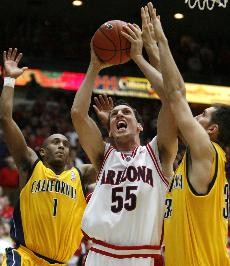Two men’s basketball teams started Pacific 10 Conference play with a win in Arizona last night, and only one of those two teams will go to a 2-0 conference record.
Those two teams – No. 7 Arizona and Stanford – go head-to-head in McKale Center at noon Saturday in a contest televised nationally on FSN.
Arizona (10-1, 1-0 Pac-10) defeated California at home last night 94-85, while Stanford (8-2, 1-0) edged ASU 71-60 in Tempe.
“”If Stanford beat ASU by (11) at ASU then we’ve got our hands full,”” UA head coach Lute Olson said. “”I’m sure that win will do a lot to their confidence.””
Confident as well now riding a 10-game winning streak, the Wildcats will play a slower-paced team in Stanford than what they prefer.
The Cardinal average 69.0 points per game, while the Wildcats average 86.6.
UA guard Mustafa Shakur said that his team isn’t concerned about the Cardinal’s pace.
“”We’re just going to go out there and play our game and not worry about how they play,”” he said. “”Of course we’re going to prepare and practice hard, but we can’t let (how they play) tear us from what we do.””
Many in the Arizona locker room agreed after Thursday night’s game that their “”sluggish”” start against the Golden Bears cannot reoccur against the Cardinal, and that the intensity must be present from the first whistle.
“”We have to put them away from the word ‘go,'”” guard Jawann McClellan said. “”I think we’ll be able to do that, we just have to come out ready to play.””
Arizona will prepare by looking at scouting reports and watching film in practice Friday, forward Chase Budinger said.
“”We have to be focused and get out there from the start, something that we didn’t do (against Cal on Thursday),”” he said. “”The intent is just to get out there from the start and never let up each game.””
After playing its first eight games at home, Stanford ends its three-game road trip looking for its third consecutive win on the road and the sixth victory in the team’s last seven games overall.
“”Every year they’re a tough team to beat,”” McClellan said. “”They always come here and play well, and we have to do a good job of making a statement.””
Arizona forward Marcus Williams made a statement last year in a 90-81 overtime win against Stanford in Tucson, scoring 22 points on 9-of-13 shooting.
“”I remember that,”” the reminiscing Williams said with a laugh. “”Hey, I’m just worried about getting a ‘W.’ I try to have good games every night. I know everyone else is on the same page with that. We just need to get good shots and take care of business.””
The Wildcats also beat the Cardinal on the road, 76-72, and in the first round of the Pac-10 Tournament, 73-68.
Like Arizona, Stanford has relied on the same five starters every game this season after losing three all-conference starters and four seniors from last season’s squad.
The Wildcats will be in better shape this year now that forward Matt Haryasz – who averaged 18.7 point per game against Arizona last year – is out of eligibility. Replacing Haryasz in the middle are a pair of players unlike any Arizona has or will face this season. 7-foot twins Robin and Brook Lopez were McDonald’s All-Americans last season and came in as heralded freshman, reminding some of former Stanford twin big men and current NBA players Jason and Jarron Collins.
In their first Pac-10 game against ASU on Thursday, the twins ran into a problem many young centers face in college basketball: foul trouble. Robin, who starts and plays 22.4 minutes per game, picked up four fouls and was limited to three rebounds in 22 minutes. Brook, who comes off the bench and plays 12.2 minutes per game, picked up four fouls in four minutes without recording a point or a rebound.
After appearing in six games last year and starting only two, forward Fred Washington elected to have surgery to repair a tear in his patella in his left knee.
He sat the rest of the season, but he has returned strong as one of the starters and top scorers, shooting a team-high 62.2 percent from the field.
The man to watch this year, however, is forward Lawrence Hill, who leads the team in scoring. He averages 14.8 points per game on 57.8 percent shooting to go along with 6.1 rebounds per contest.
“”Hill has been playing really well,”” Olson said. “”They’ve been playing him inside and out, and he’s been doing great.””









